#and thus it takes longer to write something that's less immersive and it's a lose-lose
Explore tagged Tumblr posts
Text
Me: I should branch out from writing only short stories and try to write longer works.
Me after writing less than one scene of what could be a longer work: I should write all my stories as flash fiction where all the scenes are 2-5 sentences long.
#adventures in writing#for what it's worth i've found out that writing in 3rd-person omniscient storyteller voice *seems* easier#but in practice it actually takes longer to craft because the voice doesn't come naturally#and thus it takes longer to write something that's less immersive and it's a lose-lose#fortunately the process of learning this involved rereading an old work where i wrote drafts in both styles#and learned that third-person limited flowed better#however after writing the queen emma story#where an idea that could have been a several-days writing project got done in a couple hours#and was good enough#i'm tempted to use that format for all the ideas fighting for my attention#*road to el dorado meme* both. both is good
13 notes
·
View notes
Text
Speaking of writing advice, I get asked a lot if I have any tricks for writing dialogue, so quick post about that, because I do, actually!
Really, its just two simple things that can make a huge difference: listen to people talk, and read your dialogue out loud.
The first sounds simple, but its more about just increasing your awareness of how DIFFERENTLY most people talk, even if they do sound similar in a lot of ways. And the key here is like, I don’t mean watch TV or read books, because what you’re absorbing there is still ultimately just other writers’ interpretation of how people talk. Which is still one step too many removed from the source.
I know its not as easy during a pandemic, as say, when you could just go write at a food court or coffee shop, but even just listen and absorb stuff while your family is talking over dinner or your friends are all in a group call or whatever it is you’re personally doing to have social interaction offline these days.
The point isn’t to like, listen in on conversations and be a creeper, lol, its more just about trying to attune yourself to the wide VARIETY of ways in which people speak. I’m talking everything from inflection to patterns of speech to rhythms of it....the way some people pepper a lot of filler words into their speech patterns, like ‘like’ and ‘y’know’ as they try and search for just the right word they want, and the way other people take their time and are more deliberate with their speech, erring on the side of always saying exactly what they mean even if it means they don’t say as much.
And thing is, this isn’t just about improving dialogue, it really helps with your character work as well. Because one of the most common pitfalls a lot of writers fall into - and like EVERY single agent or editor I’ve ever known has agreed on this - is a lot of writers accidentally fall into the trap of making their characters all sound alike. And this isn’t something that routinely comes up in criticism from readers and audiences....because its one of those things that people absorb when reading a work without often even realizing that they’re absorbing it. And it usually is one of the distinct markers between how much or how fully someone is immersing themselves in what they’re reading......the more ‘real’ the dialogue sounds, the easier it is to lose yourself in what you’re reading and lose the separation between the words on the page and your own perception of them as just words on a page.
Because dialogue, what we say, is one of the clearest indicators of who we are, when we can’t all know what each other is thinking. And its no different for written characters, especially when you’re writing in a limited POV that at most allows you to ‘see into’ the thoughts of one character at a time. What people say - even if it is often contradictory or not an honest indication of what a person or character is really feeling - its still one of the only things we have to go on when trying to get a sense of who a person or character is. And thus, the more what someone says is DISTINCT to them, is something that’s so clearly them that you could imagine closing your eyes and still being able to identify them by what they say - not the sound of their voice, but what they say and how they say it, how they sound when they say it even if its just written words.....the more distinct that person or character is in your awareness as well.
And the more you can increase the individuality of your characters by layering in the LITTLE things....the inflections, the vocabulary choices, the rhythms and filler words or lack there of.....the more real they feel for other people. Don’t fall into the equal but opposite trap of trying to rely too much on linking characters with certain keywords or phrases....this is kinda an artificial individuality. Take for instance Batfandom.....I think a big part of why we see so much of Jason calling Dick “Dickhead” and JUST Jason, like, also has to do with it being an identifier for Jason, a way to distinguish Jason’s dialogue from others even when you’ve got four or five characters all present and talking to Dick, so that he stands out even without having to name him every time he talks. Same thing as leaning on Damian’s “tt” sound not just because you feel its what he would make in a moment but rather just because you’re trying to make him distinctly Damian and that’s the easiest go-to.
The problem with leaning too much on this stuff is its a fairly shallow link or association....and one that any character can hijack at any time, for any reason then. If then, Tim makes the “tt” sound because he’s trying to mimic Damian for a joke or insult, or multiple characters who aren’t usually present are making jokes about Dick’s name so its no longer for this chapter just a Jason thing.....you’ve kinda shot yourself in the foot, by relying overly much on stuff that you may personally associate with a character....but when its the only association you really lean on, and its an association that can easily be spread to other characters....its effectiveness is completely diluted.
So focus less on what people SAY and more on HOW they say it. How they remain clearly and distinctly THEM in your impressions or general awareness, even as they say what’s essentially the exact same thing someone else is saying. How two people can say the same thing in totally different ways that sound like totally different people, etc.
And then part two of this is, when possible, when alone and editing or whatever, read your dialogue back aloud. This helps you detect the stilted, artificial parts where you’re trying too hard, when you’re attempting to FORCE a character to sound a specific way or carry a specific tendency, and its not feeling natural or organic. Because that’s the stuff that does come through the page when reading it, and that makes readers feel less.....immersed in what they’re reading because even if not on a conscious level, they feel like something is off, or not quite ringing true. They’re not fully able to commit to feeling like they’re part of the scene or just outside it listening in, because its a little too clearly a SCENE still in their awareness, rather than just events unfolding around them or near them.
And it also helps you see and evaluate how well you’re distinguishing or separating characters from each other on the page. Because when you’re reading ALL their dialogue out loud...and you have just the one voice, and your own natural ways of reading and speaking.....the more you’ve varied up your characters with different patterns of speech and identity in speaking....the more this will shine through because what you’re reading will start to kinda....take over and hijack how YOU read/say what they’re saying, to sound more like their rhythms and patterns and inflections. And when you’re reading, say Barbara out loud, and then reading Jason out loud and then Bruce and then Tim, and its still just you but they’re all SOUNDING totally different even just in your own voice, and its not even just because of specific single words or phrases but rather just the PERSONALITY shining through from each bit of dialogue....that’s how you know you’re on the right track.
14 notes
·
View notes
Note
Whats your favorite power system in all of fiction? The simplicity of dbz's? Something more complex like nen? Something not from anime at all?
I generally steer towards hard magic/power systems: something with defined rules that allow for both limitations and VERY awesome victories if you can figure out how to twist the rules in your favor. That’s one of the reasons why I enjoyed Harry Potter and the Methods of Rationality. That (parody-esque, highly analytical world of HP) takes those rules to their logical endpoints. If transfiguration has the hard, established rule of “No transfiguration will last forever” then you get to see how different characters grapple with that rule. Some will see it as a limitation - “Dammit. That means we can’t use transfiguration to solve world hunger” - and others an opportunity - “What if I turned something deadly into an apple, had an enemy eat it, and then waited until the transfiguration wore off?” You also open up the possibility that a Super Special Protagonist will someday break that rule in a moment of pure awesomeness. One of my favorite moments in that series is when Harry rattles off all the ways he can turn a normal classroom deadly and though it’s horrifying (it’s supposed to be), he’s also right. Characters who exist in worlds with established rules and who bother to learn those rules are poised to exploit them in wonderfully satisfying ways.
This is partly why RWBY’s system doesn’t appeal to me. It’s largely dependent on what the writers want at any given moment, making the world feel continually shaky rather than a real, immersive thing that the audience can delve into. Weiss no longer uses her time ability... even though, as far as we know, she could. Ruby can suddenly slam through steel walls... even though we don’t understand how. Marrow doesn’t even attempt to use ‘Stay’ at the start of the fight... even though he, again, could. It’s those “How?” and “But they could have?” that interrupts the immersion. I think RWBY’s system is best described by Geico’s latest commercial:
youtube
“Why don’t we just get into the running car??” and then they don’t because it’s much harder for the plot if they do, not because there’s a compelling, in-world reason for them to avoid it. Only RWBY’s system has the added complications of no one fully understanding how cars work (aura), or whether a character still has access to a car (abilities), if they possess enough gas to drive it (dust), and so on and so forth until you get an audience arguing over the supposed benefits/downsides of taking the car at all, if it exists, if it runs, if, if, ifs that no one is able to answer, rather than acknowledging that we should understand precisely how a car works and the show should have explained why the characters wouldn’t use it when it’s seemingly 100% available to them.
It’s also why Witcher’s system works much better for me. There’s definitely wishy-washy elements to it, but on the whole it’s far more rule-grounded than RWBY’s is. Things like “Witchers can cast signs, but signs pale in comparison to the power a sorceress has” explain potential question such as, “Why do these characters call on dangerous magic users they don’t trust when they themselves can already do magic?” We’ve been told what the difference between these types of magic is and we understand one’s limitations. Witcher also takes the time to think through an OP character’s place in a rule-driven world: basically, give them rules as well. O’dimm is defeated not because Geralt randomly develops the ability to slay god-like creatures, or because O’dimm is made stupid and very conveniently just doesn’t use his own ability, he’s defeated because he too has rules attached to him. He will follow the rules that he creates. That allows him to remain staggeringly dangerous - he’ll always try to tip those rules in his favor - but rules, by default, are always capable of being bent in favor of the hero as well. So when O’dimm says, “If you can solve my riddle AND make it through my world AND find the object that serves as the answer... then yeah, I’ll leave.” So Geralt does. He follows the rules established, using his brain as well as his physical skills, and successfully tells O’dimm to get lost. Salem, in contrast, has no established rules and thus we get the endless conversations of, “WHY doesn’t she just destroy Atlas herself? WHY did she wait until the story started to actively seek out the relics? What’s stopping her?” If the story says “Nothing” yet Salem isn’t winning, that’s a problem. Rules not only keep the audience grounded but also present opportunities for great characterization: O’dimm is more compelling because he treats everything like a game that he’s capable of losing. A Salem with vulnerabilities or psychological limitations would, in turn, be more compelling too.
So, to go back to your anime examples, anon, I don’t have one single story to point to, though I do prefer the more complicated systems. Just because they present far more opportunity for creativity while likewise allowing the audience to feel confident in their understanding of the world and the possibilities for how things might turn out (making a believable twist on the author’s part unbelievably EPIC). Even DBZ follows broad rules like “Saiyans get stronger when they lose” and “Intense emotion is capable of providing a powerup.” Indeed, we even see some villains making use of this rule: I want a stronger opponent, you need motivation, so I’ll kill someone you love to give you that boost. It’s simple, but it (mostly) hangs together.
In contrast, power/magic systems that refuse to establish rules so that the authors are never forced to come up with creative solutions, or that keep/chuck rules based on what’s convenient, just end up being frustrating. To my mind that sort of ambiguity works best in horror: How the fuck does Night Vale work? Good question. Don’t right know. It’s that sense of “This world makes no sense” that adds to our discomfort, discomfort the genre actively wants to create. However, making your fantasy/action series nonsensical when you want viewers invested in the fights is a mistake. Your audience can’t get behind either the potential outcome or what the author eventually decides to write if there isn’t a common foundation to work from. You’re less likely to enjoy, say, a card game if you’re playing blind, or your opponent changes rules whenever they please. I need to understand what’s possible and be able to trust that we’re both using the same rulebook in order to get invested.
16 notes
·
View notes
Text
Takes a villain to play a villain: a Sanders Sides story idea
So, I was scrolling through Sanders Sides blogs, as you do, and came across a short audio clip of when Thomas played JD in that one Heathers the musical production in 2015.
And my brain just kinda... went off.
Cause like, we just had a Sanders Sides episode where we saw just how much Roman cares about Thomas being a good person, plus the whole “I thought I was your hero” thing, and it’s been demonstrated throughout the series that Roman heavily ties his sense of self and self-worth to his work, Thomas’s creative endeavors, and... it made me wonder... how did Roman feel about playing the bad guy? How did he handle immersing himself in that role for weeks at a time?
Perhaps he got a little help.
My first thought was Remus - but while I think he could and would have given Roman plenty of pointers (requested or not), I also think he’d be a bit too chaotic to properly hone his talents and do something like, say, take over for Roman for a day.
My immediate follow-up was: But you know who could?
Now we’re here. Click the read more if you want to listen to me ramble about the time when Janus periodically impersonated Roman so that Thomas could play JD. And hey, if you wanna take this stuff or even just the basic premise and make an actual fic out of it, uh, please do? All I ask is that you @ me in it and give me credit for the original idea.
It starts one day when Roman is “sleeping in”, probably because of rehearsal going poorly the previous day, and as Thomas is heading to practice tensions in the mindscape are rising. Remus is itching for the chance to jump in and take over, but Janus reasons that giving him the creative reigns at this point can only end poorly. Yet, someone needs to take on the task, or Thomas might just lose his first big theatrical role.
So Janus, somewhat hypocritically, decides to do it himself. And, considering it’s his first time genuinely trying to impersonate one of the others for an extended period of time, and that he hasn’t properly interacted with the “light sides” in years (just observed), it goes... surprisingly well. He’d only been hoping to be passable, but he actually gets into the character, impressing not just the other actors, but Logan and Patton. Sure he almost gives the whole thing away a few times, but, at least as far as he can tell, he gets away with it. More than that, it’s fun; the most fun he’s had in God knows how long.
Of course, Roman finds out later (maybe from Remus), and quickly confronts Janus about it. It’s either in this conversation, or after the next day of rehearsals when Roman finds himself not living up to some of the expectations Janus set the previous day, that they make The Bet. Essentially, Roman gets to be himself at rehearsals for two days, and then for the next two days, Janus takes over. Rinse and repeat until one concedes that the other is a better fit for the role (or until Janus gets caught and cast out).
Now the reason I’m not writing this as a fic myself is because I have no clue what shenanigans to put in this middle section, other than maybe Roman calling Janus out for staying disguised as him and hanging out with Logan and Patton outside of rehearsal one time. There are some broad ideas that I think would be fun to explore, so I’ll just list them out and leave you to do what you will with them:
Janus getting to be at the helm for probably the first time ever and fully embrace his theater kid side (heh, side), planting the seeds for him to decide a few years later to no longer keep Thomas ignorant of the “ugliness within” him
Oh, and there’s Janus’s feelings about being seen by Thomas for the first time in years, though he’s in disguise
Drawing parallels between Janus and JD, with their views on society and the ugliness of the world, and their love for “funny wholesome pranks” as a form of vengeance
(plus stuff that won’t come into play until a few years down the line - like, imagine Janus singing the last few lines of Meant to be Yours post Virgil leaving... oh, and that one bit where JD talks about “Ich Lüge” bullets; when I remembered that I immediately thought of a fancomic I saw where Janus gets fed up with the others and insults them in German. funny coincidence)
Roman generally being insecure and trying his best
How does Roman occupy himself while Janus is being him? Does he hang with the “dark sides”? Or does he get up to stuff on his own?
The initial bitter rivalry between Roman & Janus becoming less bitter as they start sharing tips with each other, maybe even practicing with each other, because at the end of the day they both want Thomas to succeed above all else
(not that Roman will fully admit to himself that Janus truly wants that too, because, well. “if our goals aligned with his, what would that say?” no, he’s just being fair to Janus, because he’s the good guy here, that’s all.)
Remus joining in on that, and potential angst from him being passed over, but also the opportunities for him to unleash chaos without Janus there to keep him in check
Virgil experiencing what it’s like to be left behind for the “light sides” before he pulled the same maneuver
Logan and Patton catching on to the deception, because of course they would, and eventually confronting Janus about it
And lastly, consider this: one of the ways Janus is able to do the role better than Roman is when it comes to pretending to be straight. Because... not to get too into a whole other headcanon/theory of mine, but... let’s just say it’s something Janus has experience with.
Now, if I were actually writing this fic, I would have Roman slowly come to the conclusion that Janus being the creative drive for this role is what’s best for Thomas, as much as every part of him hates it, and concede to Janus. Thus, we get a mostly downer ending for Roman, who has learned from the experience and even bonded with Janus a bit but is now at the level of insecurity we’ve seen recently from him in canon; and a bittersweet ending for Janus, who had the time of his life playing the role but ending up hurting Roman (and some of the others, knowingly or not) in the process, and now has to go back to keeping his very existence a secret, indefinitely.
That all being said, if someone else wants to write this scenario but have it end with Janus conceding to Roman instead, that could work just as well. Or have them work together in some way if you’re not a fan of unhappy endings. It all depends on how you want to distribute your angst.
I’ll leave it there for now. I hope those who read this far got some enjoyment out of it. I’m gonna go back to working on my actual fic ideas now.
28 notes
·
View notes
Text
21st of April, 2020
"The One with the Fairy Tale"
(Pssst! If I were you, I'd read this post first before starting this new one!)
I cannot believe this is my life.
A couple minutes before the 8 AM rush hour, a Google Classroom notification from V arrived. Then another. Someone likes a spam, I thought, before opening the first one.
Sigh of relief. It was only the essay I'd already sent her. On to the next one, the detailed info on what we were covering today. The play on the table is both figuratively and literally a fairy tale. V, pretty critical of the play and its character work itself, made sure to bring one particular monologue to our attention, which tackles a rather difficult topic in a pretty simple play about love and longing — human mortality. "(It's my particular favourite, too, but don't let that influence you.)" She wrote after explaining what it was. The last paragraph though, now that was something else. "For those of you interested in an A level (here you imagine me looking at certain people)" she began, and my eyes widened as I read it. Sure, there are literature buffs in both classes, but... I can't help but think it was first and foremost an indirect to me. I mean, I'm probably the biggest nerd out of all of us, and she's always looking at me anyways... I want to dream big and say she wanted me to see it most. I mean, it's a link to an incredibly long essay. The situation speaks for itself.
"Look at this silence," V said as she entered our server at around 11 AM. Once she was here, we (as in all of us) started chatting about the break and quarantine. "It has been Sunday for two months." I declared, V immediately continuing the thought: "That part of Sunday, no less, where the line between the previous week and the next one blurs." Couldn't have said it better myself.
As V spoke about the story, I just leaned back on my bed, letting myself get immersed in the explanation and the sound of her voice while trying to imagine everything. After a while, it all started sounding like the plot of Mozart's opera, The Magic Flute — especially when V said that our protagonists, a human boy and a fairy girl, both had companions of the same sex along the way. And as soon as she said those companions are actually married, I waited for her to take a tiny break in speaking and said "How surprising." According to Bookworm Friend, she laughed, but I couldn't hear it clearly because someone made a noise. Then she said "Obviously..." and basically shaded the whole plot line, though I don't remember the rest of the sentence. And guess what she brought up immediately? That's right. The Magic Flute. I was floored! "That's what I was thinking, too!" I chimed in immediately. She took the words out of my mouth! And, soon as I said that, I got a text from Bandana Friend.
BanF: "Wow the twinning"
It's official, folks. Even from a distance, V and I are sharing a braincell.
Serious shit went down in class, including pointing out some... very suggestive imagery that caught us all off-guard because the thing she mentioned isn't inherently suggestive, but okay, V, you do you. (Obviously, I'm not going into detail here, nor sharing the conversation Bandana Friend and I had here because... this is simply not the platform.)
But what I can share is a really funny bit that caused a bit of a pandemonium in the separate class chat none of our teachers are in. You see, about half an hour into class, The Boyfriend sneezes with what is probably the volume of a medium-sized family house collapsing. About five seconds of absolute comical silence follows, then we just hear V saying "Sorry. I'm sorry." before carrying on. All this caused quite the stir, featuring texts like:
BanF: "The whole house just quaked"
and
Classmate: "Jesus who was this 😂😂"
Classmate: "Tell me it wasn't [V]"
S: "No, her man"
Classmate: "Good heavens I thought it was her 😂😂"
and
S: "I laughed so hard that I thank God I was on mute"
So yeah. That's on that. Bit later, with the words mentioned here, V ended class, and there I was, on Cloud 9, dancing around my room and humming Disney songs from the sudden serotonin charge. That was probably the moment I decided to read the play V spoke about. You see, she didn't assign it because the wording is quite difficult (the text is quite old) and students usually struggle with it, but she said that we wouldn't lose anything by reading it, if we wanted to. And thus it happened that I sat down on my balcony at around 5 PM with the first chapter open on my phone, ready to read.
I knew she'd be right. I trust her opinion and my reading comprehension skill suffers at the stake of my absolute inability to concentrate for longer than 10 seconds. But guys. Some of the longer sections I had to go over at least three times before I understood what was going on! An hour or so must've passed when I read the last line of the first chapter, and the butterflies in my stomach took flight. It was time to text V about it. It was my original plan, anyway. Figure out how right she was, then tell her about it. I was already incredibly nervous, trying to stick to what I'd planned on writing. My fingers typed on autopilot and as soon as I was done, I could barely believe I was actually going through with this. But alas, you only live once, carpe that fucking diem. One big breath. Two biiiiig breaths.
Send.
S: "Well, Miss, I'm not saying you were right about the text of [the play], but I've only read Chapter 1 and I'm already doubting if I even speak [my native tongue]... 😅"
I immediately tossed the phone on my bed and ran away panicking. What will she say? How will she react to seeing it's me again? What does she think? Am I funny enough? Am I bothering her? When will she reply?
Half a minute later (!!!), I see the icon of The Platform That Shall Not Be Named on my screen. No. No. No. Nonononononono. I picked the phone up and unlocked it with a shaking hand. I was not prepared for what I was about to read.
V: "Hahaha, well, babydoll...You do. You're just not used to [the old-timey wording]."
I only had the time to sink to my knees, eyes wide, lips agape, when the next message followed.
V: "Though, once you're already through it, I'm curious about your opinion on the play's stageability. 😄 (given such a word exists)"
You bet your asses all air left my lungs. Not only did she call me babydoll again, now in a way that I could forever remind myself of it, but she basically just prompted another conversation! She wants to talk to me again! And I'll have you reminded, V's basically trusting my judgement based on the scriptbook I showed her at the dawn of time, that she'd never actually seen in action! I wonder what I did to earn all this trust...
S: "I'll see at the end and tell you :)"
V: "Alright :))"
Then, all brave from the double smiley, I had a really stupid and impulsive thought. (Don't yell.) Me being the little shit that I am, I googled stageability and took a screenshot of no results having been found. I took a screenshot, cropped it and sent it to V, my head being completely empty as I did. I acted purely from gut feeling.
S: "Tough luck this time, it seems😄"
V: "i thought so!"
(I can only hope she took it as a joke. But, the way I know her, she probably understood. Still, the me of right now, exactly two days and two minutes later, wouldn't do it.)
And this is where it ended. This is where I ended. My hands, my legs, even my lips were trembling as I tried to process the sudden load of emotion overcoming me. What did I just do. What did we do. What happened here. All this just echoed in my head, and I went ahead and texted every friend I wanted to tell in all caps.
BanF: "WOAAHHHH"
BanF: "you guys have really warmed up to each other"
Even now, as I was typing, I got the chills just thinking about this conversation. If it wasn't for the 'Miss' and my use of formal pronouns in the very first text, it would've just felt like two friends, who happen to both love literature, talking. And this really warms my heart, because there's this fantastic woman, who I genuinely think is one of the best influences on my life and... she just likes me for me. She immediately answers when she can, comes off genuinely happy to talk to me, prompts another thing I can tell her about and all but tells me that my opinion matters to her. Because this is her. I'm almost convinced that I will never hear her outright say that she likes me or she's proud of me, but, should I have any doubts, she does everything to let me know. I just misunderstand her sometimes, not knowing where to look.
When I tell you all this still doesn't feel real...
~ S ♡
[Every story I share here, no matter how specific I get with my wording, depicts actual events from my own life.]
4 notes
·
View notes
Text
unpopular opinion:
s1: really nostalgic atmospheric lovingly-made slow-paced and optimally filmed (directed, cinematography, art direction, consecutive pallette, great editing, written, LIGHTING, props, TONE) tribute to the 80s through its use of homage-like film moments, cinema archetypes, political horror, magical mundane, and memory-wise
s2: literally none of that and used the 80s as window dressing rather than to enhance and enrich the plot in a truly immersive and engaged/active way
im really surprised actually when i see constant praise that this show is such an amazing recreation of 80s cinema when objectively s2 decreased in quality so much. like it is almost an entirely different show in s2 and seemed to take every element of s1 and instead of expanding upon it, reproduced and regurgitated it in more bloated and less narratively-progressive manner. but for s1, i agree with the praise.
i always wonder if netflix forced them to come up with a s2 as fast as possible to bank on the show's popularity and thus they kind of just carbon copied s1 in a sillier, bigger, more cgi, less thoughtful, more disney ? way (- see: suddenly the main antagonist of the show The Lab is now their good pal and hopper, the disenchanted government critic vietnam war vet who spent s1 as a reserved and tormented detective uncovering their horrifying lies to his own peril but to help a friend regain a child in a way that he could not, literally works with and for them?, el literally comes back through a hole 5 feet from where she disappeared mere seconds later negating her whole beautiful 80s film glory sacrifice when she could still be involved but not return so simply and quickly? nancy and mike who both lost friends to trauma, discovered an alt world, and emotionally finally connected never have even 1 conversation in s2? jonathan has no scenes and never once talks to steve bc apparently since only 1 of them can date nancy they no longer speak or debrief or wonder about the horrifying interdimensional monster they fought together? karen who was a huge mirror to joyce and maternal presence in the show is pretty much written out? the whole fascinating and pivotal political and government angle to the show is written out? el has a literal blood aunt but she gets left with hopper in a very plot devicey type way? the list is literally endless for every single character), when it seems it wouldve been more faithful to their vision to do something less chummy.
it seems like the show wouldve been a more loosely structured dnd-esque adventure of the core 4 losing and gaining friends, fighting villains, and maturing along the way as they grew to adulthood, but that kind of got derailed into a more freestyle, less tight plot - which didnt really work at all with this.
i feel like the only things that were original to s2 were will's amazing arc in s2 as the groundwork for that was laid in s1, and kali who never got the screentime or exposition she deserved in a season which had terrible pacing and editing. the duffers always speak of wanting to add an element of human evil to the show with billy but... they had one. The Lab and the government experiments. that remains the scariest villain of the show to date and i always wonder why it was dropped. and with better writing those things could be linked or it couldve had breadcrumbs to that effect in s2 (i always assumed billy was also an experiment as s3 stuff seems to confirm but, ... it couldve been written way, way better).
st is not like say breaking bad which has a perfectly consistent tone in every single ep for 5 seasons, which made that show one of the very few modern masterpieces for its commentary of villainy, societal expectations, the half man half beast trope, as well as the destructive nature of our modern economy, social expectations, and health system etc.
im not saying st is a bad or unenjoyable show - its an awesome and fun show that i love. i was just v surprised by s2 given the quality of s1 and am always surprised at the praise it gets for being such a consisent and beloved 80s throwback when s2 had honestly none of that vibe at all. i hope we go back to s1 type vibe with the badass horror blood and guts throwback.
#i always wonder what happened to s2 like what??? it is literally so different in every way in every category#stranger things#i wonder if netflix intervened bc it became so popular or if the quality just changed to much#i am hopeing s3 is more like s1#i still like s2 bc it was all the characters we grew to enjoy watching and will was great#but was it the same show? literally not at all#*hoping
3 notes
·
View notes
Text
22 Things I Learned by 22
I don’t know about you, but I’m feeling 22! Yes, you read it right. I just celebrated my 22nd birthday so… Happy birthday, self! I’m officially in my early 20s. While there’s so much to look forward to, I know that there is a certain level of pressure that comes with getting older. I know I’m still considerably young, but at this age, society expects young adults to have their lives *figured out* already. So yeah, this is me succumbing to the pressure and pretending to know what to do, where to be, how to act, and when to take risks. *note sarcasm*
I must say it’s really awkward to start this entry with that greeting but there isn’t much that I can do about it. It’s the very reason I’m writing this one. *sighs* A month ago, I was thinking of a fun way to celebrate my birthday. We’re still stuck in quarantine, and even if some establishments are already open, I’d rather be safe than sorry. So, I thought of posting something on this site to sort of celebrate my birthday and share something to the people who might be interested. With that being said, let give you the 22 Things I Learned by 22!
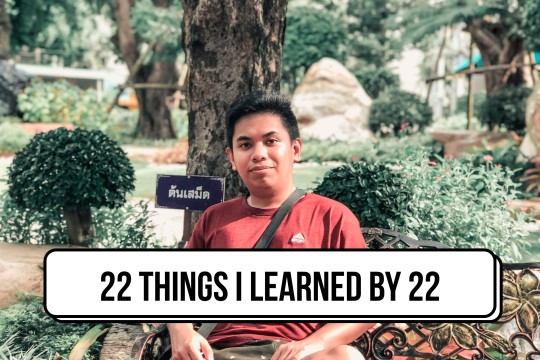
Disclaimer: I am, in no way, an expert to giving tips and pieces of advice, but traversing through adulthood taught me a couple of lessons which I think are worth sharing. I only finished school last year, but my sudden immersion to the “professional world” a.k.a. work life allowed me to go through paradigm shifts I didn’t ever think I would experience. I’d like to say that I also saw the harsh realities of life 2 years into this path I’m currently taking. So my advice to you is to take everything you’re about to read with a grain of salt. *winks*
1. Health is wealth.
Now that we’re experiencing a global pandemic, I realized how important health is. I used to eat whatever I want (hence, the weight loss and weight gain cycle) and deprive myself of sleep. Now, more than ever, is the time for us to take good care of our bodies. #panggap lol

2. Work is hard, that’s why it’s called “work”.
My internship is Thailand gave me a glimpse of the life of a teacher (which I thought was fun) and I thought that it’s more or less how it feels in the real world. Not that it isn’t fun, it’s only now that I realized how heavy the responsibility is– that it even extends outside of the classroom.
3. Small talk is boring.
I’ve always been one to enjoy lengthy, deep, and mind-boggling conversations. It bores me when I meet people and we just engage in small talks. Like come on, let’s talk about music, politics, religion, mental health, adulting, etc. I think it’s the reason why people get tired of the “Kumain ka na ba?” narrative. *face palm*
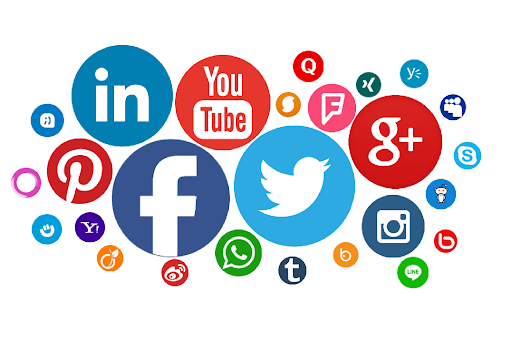
4. Social media is not real life.
I used to scroll through social media endlessly to know what everyone is doing, but after a while, I realized how it’s only a reflection of someone’s highlights. A person can look good and perfect on Instagram, but behind the filters and curated feeds are people who deal with problems and struggles on a daily basis.
5. Happiness is a by-product of purposeful living.
To achieve happiness, you must live purposefully. It’s a matter of motion before emotion, so before you feel happy, you have to do something that’s good for your soul. Stop making excuses. Pursue your passion. Serve others. Find your purpose. Design a life that’s worth living and happiness will come to you.

6. Change is inevitable.
I know this a cliché, but going through changes and shifts over the past two years taught me to acknowledge change. As much as the people, things, and feelings change, I also do. It makes me sad sometimes how I’m no longer the version of myself that I used to be, but I’d rather change than stay the same.
7. Rejection is redirection.
People see rejection as a bitter pill, but I realized that it saves you from something (or someone lol) that isn’t meant for you. It sucks to be rejected but if anything, it leaves an open space in your life which you to acquire something. So pick yourself up and move forward.
8. Jumping into conclusion is a bad habit.
I know it’s easier to just analyze things in your head but if you can, communicate. Scratch that, you MUST communicate. Don’t let your thoughts cloud your judgment on a person or a situation just because there isn’t an explanation for it yet. Clarify, then comprehend.

9. Being busy is different from productivity.
Productivity means achieving the things that you have to do and being able to rest deliberately. If you’re just working all the time and have a lot of things on your plate, then you probably are just busy. Use your time well and work smart. Avoid spreading yourself too thinly and maintain your focus.
10. Overthinking is a waste of time.
Oh, I can’t stress this enough. I am NOT an overthinker, but I’ve met some people who are. Thus, I’ve also seen how it takes up much of their time. Sometimes, your biggest enemy is your own mind. Stop overthinking, let it go, and give yourself peace. Pray about it and trust the process.
11. People change and so do relationships.
It saddens me how I’m no longer friends with some people I once considered my “best friends.” People grow, and sometimes, we grow in opposite directions. I know I have my fair share of faults, but I choose not to blame anyone anymore. Perhaps, things are better off this way– distant, but at peace.
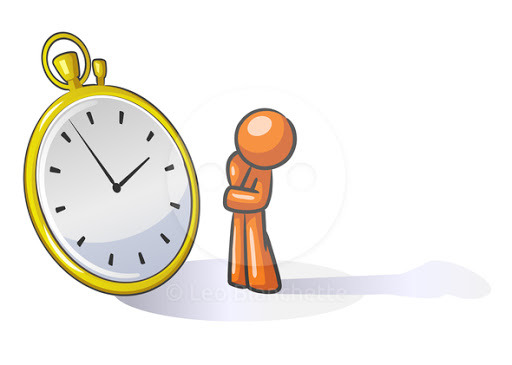
12. Waiting seasons are not wasted seasons.
Finishing college, getting a job, earning my license– these are just some of the things I achieved last year. Trust me, I spent countless days and nights just waiting for these things to happen, and while I was waiting, I focused on the things I can do. The longer the wait, the sweeter the victory will be.
13. Supporting others will not invalidate your success.
Support other people on their winning seasons because you don’t have an idea what they lost during their losing season. It’s all a matter of timing. If other people seem to be winning, clap for them. You’ll have your time soon, and when it happens, your success will be magnified.
14. The biggest pains can come from our pleasures.
“If it feels too good, question it.” This is a quote I got form one of my favorite podcasts. Sometimes, we find delight in things without seeing through them. Watch out for the things that seem to be perfect. I’m not telling you to be suspicious. What I’m trying to say is that you should guard your heart. *winks*

15. Baby steps are still progress.
Taking small steps towards the right direction is better than running fast heading to the wrong direction. Need I say more? Value your small efforts. Take it one day at a time. The rate that other people are operating at should not dictate your pace as long as you have your eye on the road.
16. What others think of you is none of your business.
Whether you do good or bad, “some people” will always have something to say. I guess it’s just engraved in their identity to criticize and find faults. We may feel the need for validation to come from others, but if there is someone who knows you more than anyone, it’s you. Keep doing you!
17. Save money wisely.
Adulting is not complete without money matters. In your 20s is the best time for you to save money wisely and by wisely, I mean: a) cut down unnecessary expenses; b) invest on the things that you can use repeatedly; and c) don’t put all your eggs in one basket– have various savings for different purposes.

18. Don’t operate on high emotions.
Growing old teaches me not to be a slave to my emotions. I’m more of a rational person than an emotional one, but there are STILL times when my emotions take a hold on me, and when I do, I tend to say things that hurt people. Let your emotions die down before you say/do anything.
19. There is a time to give up.
At some point, you will realize that some things aren’t mean for you and it’s totally fine. By holding on to ~those things~, you might be wasting more time. It’s about accepting the things that you can’t control, the things that aren’t for you, and the things that you can pursue. *fist bump*

20. Growth can be painful.
When it’s scary is the best time to jump. Taking risks is just a constant part of adulthood. Going out of my comfort zone is one of the best decisions I have made. You’ll grow even more when you are in unfamiliar places and new environment. Have it in you the courage to take that leap of faith!
21. It’s not your job to fix people.
Even if you give them all the love in the world, people will still remain the same if they refuse to be helped. They will keep doing the same things and acting the same way despite your best efforts. Hence, you can only be there for them and teach them how to heal themselves.

22. Put yourself first.
Last but definitely not the least, prioritize yourself. This is one lesson I learned the hard way as I constantly put other people before me. While I still struggle with this, I now take self-love more seriously and value my mental health above anything. You have to save yourself because everyone is busy saving themselves. #harshtruth

And that wraps up the 22 Things I Learned by 22! Again, I’m not an expert and I’m just a mere young adult wading my way through this crazy world. I just hope these things made sense to you as much as it did to me. There are still a lot of things that I want to include but I only wrote the ones that resonated well with me– think I can reserve them for another blog entry. What else do you want to see here on my blog? Let me know by sending me a message and I’ll try my best to post more entries.
Don’t forget to check out my social media pages!
Till the next entry!
Bry. x 102420
0 notes
Note
Hello! I don't know if you've discussed this before, but you mentioned your first language was Spanish, I was wondering how Shakespeare's writings translates into other languages? Like if they're able to keep the rhyme and meter and such? Thank you!
Hello dear! Oh my, I’m majoring in translation studies, you know, so I have a lot of feelings about this—I actually wish to become a Shakespeare translator in the future.
My knowledge is limited to the languages I understand, of course (so Spanish, Portuguese, Galician, French, and Italian), but in my experience, a translation is ultimately a metamorphosis. Each language has a different vibrancy, a sort of uniqueness that defines it; they embody reality in their own peculiar way, and the speaker’s thoughts flow differently through the shape of its words. What distinguishes a language is its own rarity and its personal beauty.
The act of translation must be conceived within these differences; it is about changing a text, furnishing the words with new colors. That is, you have to cheat on Shakespeare in order to do him justice: in your translation, Mercutio and Romeo might not play with the word ‘goose’ in 2.4, but they shall play with another animal or thing which is related to race, folly, and women in your language. Ultimately, what we must do is alter the flesh of the text, its words, and hopefully keep its true essence intact: we must learn to discern that wordless beauty which lies beneath the language of the play and let it flow it in our own text with new words. It’s a constant paraphrase. To quote Juliet, we need to drink from the utterance of the characters’s tongues. To translate a Shakespeare play is to delve into all its complexity—a translator must be a reader, an editor, a critic, a writer all at once. One must bare the play entirely, and then dress it again.
The problem is, of course, that since all languages possess their own distinct beauty, it is simply quite impossible to translate a text word by word. It doesn’t work, the language will not let you do so. This is especially frustrating when it comes to poetry, as in Shakespeare’s plays and poems. The very pulse of the English language is palpable in the Bard’s work: he plays with its rhythms, defies its limits, embraces all the meanings of a single word, completely immersing the reader in the force of his verses. I find English to be a very lyrical language, as if poetry flowed naturally from its bones: indeed, iambic pentameter is meant to echo the normal rhythm of the English language. But it would be a very arduous task to keep the iambic pentameter in Spanish. The soul of the language complicates it. Our words are generally a lot longer, and we need more words than English to express exactly the same thing. (A good Spanish translation should always be longer than the original English text.) Iambic pentameter ultimately impoverishes the language because there are so many words you would be forced to avoid. The energy of both languages is therefore divergent.
So that’s one thing translators usually change. The vitality of the iambic pentameter fades away… and is unfortunately replaced by dull monotony very frequently. Many translators simply translate the plays into unrhymed verse. It’s true that Romeo and Juliet is particularly a difficult play to translate in this regard, given that it’s so rich in rhythms. Each character has their own particular color, the fabric of each voice is unique in the play. Juliet’s succinct speech is different from Friar Lawrence’s repetitive redundancy and Romeo’s boring, stylized Petrarchan verses collide with the new voice he achieves as his love for Juliet develops. The way they express themselves is an incarnation of their emotional extremes, of their own particular mindsets. (It’s fascinating how Shakespeare can reveal so much about a character through the beat of their words.) These are all things which should be mirrored in a translation, otherwise the characters will lose their own musculature—where does their uniqueness go if they all speak in the same way?
My Spanish edition, which happens to be the first version of the play I read back when my English was not good enough to understand Shakespeare, does not cherish the lyrical complexity of the original text at all. There is not a single rhyme in the play. Romeo and Juliet never compose a sonnet together, Capulet’s rhythm does not become erratic when he is mad. There is no sibilance in Romeo’s lines, ‘It is my soul that calls upon my name! / How silver-sweet sound lovers’ tongues by night, / Like softest music to attending ears!’. The message he wishes to convey is more or less the same in the translated text, but the translator withered the freshness of his poetry. What’s more important—the content of the verses or their beauty? Both are, since poetry should be delightful to the ears. In this translation, there is also no t alliteration in Juliet’s plea for the night to ’Take him and cut him out in little stars’. Her wish to have Romeo cut out in stars is conveyed anyway, but there is no sound of scissors in her voice.
But translation is an act of seduction. You must woo the text. You are going to deprive the play of part of its complexity, so you should try to compensate, fill in the blanks with the uniqueness of your target language. I’ll give you an example: in Spanish, the word romero means both ‘pilgrim’ and ‘rosemary’ and is of course extremely similar to Romeo’s name. Now, how does Romeo introduce himself to Juliet? As a blushing pilgrim (his very name means ‘pilgrim to Rome’). It can be interesting to have Juliet playfully call him romero, pilgrim, unaware that she is echoing his very name and that one scene later she will be struggling with the word Romeo at her window. What does the Nurse tell Romeo in 2.4? That Juliet has been making puns with his name and rosemary; in Spanish, she has been playing with Romeo and romero. There is a kind of symbolism there linking the three words, Romeo, pilgrim, and rosemary, which is more obscure in English. That’s something gained in translation, in spite of all the other puns which were inevitably lost in the process.
For me, the beauty of translation is that there is not a single way to do it right. The possible strategies are rather infinite. Each translation has its own value, because each translation is written by a different mind. This leads me to another major issue: subjectivity. A translator is, after all, a reader, and a reader is an interpreter (can you read a text and not interpret it?). It therefore follows that a translation is an interpretation: the translator’s own understanding of the play is tangible in the text. Something I find particularly irritating, for instance, is that many of them decide to change the last lines of the play unnecessarily: ‘For never was a story of more woe / Than this of Juliet and her Romeo.’ The European Spanish dubbing of Zeffirelli’s movie says something like: ‘For there is no sadder story than that of Romeo and Juliet’s love.’ Romeo and Juliet. My bilingual edition of the play did only a little better: it reads ‘Juliet and Romeo’. But why not Juliet and her Romeo? It’s something the translator was free to write, but perhaps the subversive nature of those lines made him uncomfortable. Romeo is a man, Juliet is a woman, so Romeo’s name should always go first. Of course, do not even suggest that Romeo might be remembered, in the very last line of the story, as being hers.
Sometimes translators love to stray from the text too much. They are, after all, writers creating their own text, but their creativity may have serious consequences in the characters. In the European Spanish version of Zeffirelli’s movie, when Romeo asks Juliet to express her love and thus ‘sweeten with thy breath this neighbour air’, he says: ‘Make this neighbour air die of jealousy’. Now, I cannot imagine Romeo saying such thing! He always rejoices in Juliet’s ability to regenerate the world. Juliet’s love does not kill, it enlivens Verona. If anything, the only thing she would kill is the envious moon. So translations can sometimes contradict the text unnecessarily. This is something we should always bear in mind—a translation is never completely the same text as the original, as it is subject to hermeneutics. You are reading, after all, someone’s interpretation of a literary work. It is a secondhand possession of the text.
A careless translator may fill the text with small incongruences: in the American Spanish translation of Zeffirelli’s movie, Juliet asks: ‘O Romeo, Romeo, where are you Romeo?’. Literally, I’m not lying. Most translators decide to translate ‘two households’ as ‘two families’, but a household is not just a family. Then there are other things which are simply beyond our control. Sadly, a huge amount of Shakespeare’s puns, his ambiguity, his complexity, slip through our fingers like sand. Languages can be cruel. When Shakespeare uses a word which has more than one meaning, it is sometimes impossible to find an equivalent which covers all of the meanings. Is there a verb like ‘to die’ which may mean both to lose one’s life and to reach sexual fulfillment? Many languages lack such verb, so what do we do with Juliet’s lines, ‘When I shall die, / Take him and cut him out in little stars…’? Here she combines death and love, the Liebestod trope, anticipating what she will see behind her eyelids when she closes her eyes in ecstasy during her lovemaking with Romeo. If there is not an equivalent, a translator will probably be forced to choose just one meaning. She will either talk about death or sex. (My solution is to make her speak of the climax of death, the deathly zenith, or something equally suggestive of sexual fulfillment.)
Shakespeare is of course a master at making puns—his way of bending words is delicious. When translators cannot keep all the possible readings of a word, they weaken the text, making it bland, easy, unshakespearean in many ways. It can be heartbreaking to be a translator then, because you must bury many of Shakespeare’s puns. The battle of wits between Romeo and Mercutio in 2.4, for instance, is removed entirely from many translations because it is so hard to translate. Unfortunately translators are forced to make choices they don’t want to make. They have to minimize the play. ‘Her eye discourses’, says Romeo. That’s her eye and her I. In translation, it is just the eyes. Sometimes it’s the only thing you can do: kill the beauty of the play.
Lastly, the act of translation not only implies the words of the text. It also encompasses the culture, the life of the language, the people behind it, its quintessence. Shakespeare was writing with an English audience in mind. Who are you writing to? What happens when you translate Henry V into French? How will a French audience react to the treatment of France in the play? How will you solve the problematics posed by the bilingual scenes? The last scene, for instance, relies on Henry and Katherine’s inability to speak each other’s languages fluently. How will you translate that solely into French? Don Adriano de Armado is continually mocked at in Love’s Labour’s Lost because of his flowery speech. How will you keep the different registers of the characters’s speeches in a Spanish translation? How will a Spanish reader feel about Don Armado’s situation? What happens if you translate Macbeth into Scots? Also, Peter sings Heart’s Ease after Juliet’s faked death. It’s a popular song of Shakespeare’s era—but Peter is supposed to be Italian. If you translate the play into Italian, will you keep the English song (which will convey nothing to an Italian audience) or will you replace it with a popular Italian song (which they will be able to identify as part of their culture)? It’s complicated. I recommend that you read Shakespeare and the Language of Translation because it covers these and many other issues.
And while nowadays translators do promise to tell the same story as the original author, it’s not always been like that. The concept of copyright is relatively new. One of my professors was quite obsessed with Shakespeare, and he always told us about translators who used his work to denounce the situation of their countries, i.e. a Polish translation of Hamlet in which Claudius was a German kaiser, a French Claudius who resembled Napoleon, a Spanish Hamlet which criticized the Enlightenment, etc. These translators purposely hid behind Shakespeare’s name to tell their own stories. These may not be faithful translations of Shakespeare’s work per se, but they are extremely valuable nonetheless.
So to answer your question, the blood of the characters, their heartbeat, their powerful da DUM da DUM da DUM da DUM da DUM doesn’t usually survive in translation. But a good translator must find other patterns, provoke the text and make it burn—or to quote Romeo, to suck the honey of its breath. It can be chaotic or it can be fascinating; either way, it will always be daring, risky, a violent delight which may have a violent end or not. It is important to consider that a translated text belongs not only to the original writer but to the translator as well. The translator is to unstitch the texture of the play, only to weave it in a new fashion. (It can never be entirely loyal to the play—if a translation is a mutation of the text, how could it ever be 100% loyal? The concept of loyalty here is inherently a flawed one.) But it might be worth the risk, because a new kind of beauty may bloom thanks to the translator’s skills.
When I started translating excerpts of Romeo and Juliet for fun I was terrified. I venerate Shakespeare’s work so blindly, I did not even dare remove a comma. But my professors keep telling me that a translator must be brave, a warrior, a strategist. To translate Shakespeare is to possess him. Sometimes you have to destroy his beauty, only to generate a new kind of majesty out of all the broken pieces. That’s when translation becomes valuable: when you dare merge your own voice with that of the Bard—a trespass sweetly urged.
#answered#thoughts#Shakespeare#Romeo and Juliet#Hamlet#Macbeth#Henry V#Love's Labour's Lost#thank you for your ask!#I have a lot of feelings about this#this is what I want to do with my life#I'd love to write about Romeo and Juliet and translation for my BA research project
57 notes
·
View notes
Text
5 Ways to Attract More Customers with Ecommerce Video Marketing

The advent and sprouting growth of video-based social media, stories, and live streaming turned video marketing into more than an optional promotion strategy. Right now, an ecommerce development team can no longer afford to miss out on engaging with audiences via video content - otherwise, they lose traction and revenue.
Since thousands of videos are released online every second, it’s extremely hard to stay relevant and hold people’s attention. To succeed, business owners need to watch and incorporate video marketing ecommerce trends into their content strategies.
Video Marketing Statistics: What You Need to Know
To build successful video marketing strategies, you need to understand your audience’s watching habits, the platforms, and tools people use to engage with branded video content, as well as the content formats they are most responsive to.

If you are new to video marketing, the following statistics will help you understand where the field is currently at and how to take advantage of the latest trend when connecting with audiences.
Over 80% of companies use eCommerce video marketing to reach and communicate with target audiences;
Videos are responsible for almost 90% of the overall custom ecommerce website traffic;
Vertical videos are gaining more traction - in fact, 82% find it off-putting to have to watch clips in different screen orientations.
One billion video hours are played on Youtube every day.
How-to searches are a dominant trend on Youtube - they account for 70% of all queries.
5 Video Marketing Trends You Can’t Miss Out On
The competition for every view on Youtube is fierce right now, as there is an ongoing rivalry between non-corporate and branded content.
While large-scale brands manage to find their following thanks to high promotion budgets, small business owners are confused as to how they should cater to online viewers.
To stay afloat in the market, you have to be one step ahead of your competitors. To be a pioneer in implementing new content formats, take these emerging trends into account as you layout video marketing promotion strategies.
Ecommerce Video Trend: Authenticity & Relevance Go Hand in Hand
Brands used to conquer the eCommerce video market with big budgets and huge production teams - but that didn’t last. Marketers realized that buying the audience’s trust with fancy transitions and expensive sets is not the right strategy - instead, they needed to become relatable, which implied less scripted content, lower footage quality, and not being afraid to show their imperfections.
Media companies and businesses started writing relatable scripts, referencing memes and pop culture. Such a leveled environment is good news for small business owners that are limited by budget constraints.
In today’s video era creativity and authenticity will get you farther than high production quality ever would.
In modern video marketing, Dove is one of the most active authenticity advocates. The brand chose a cause - helping women break through the stigma of conventional beauty standards, and is enforcing it in short and emotional spots. Their famous ‘Choose Beautiful’ campaigns are one of the most authentic and original brand videos ever made.
youtube
Takeaway: If you are wondering how to produce authentic content, start by defining your company’s values and mission and think how every piece of content you release promotes the chosen cause. This way, a business manager will be able to make a stronger connection with prospective customers on the grounds of relatability.
Ecommerce Video Trend: Instagram Videos Are Growing
Youtube and Facebook used to be the big dogs when it came to video content. Now, Instagram challenges and rivals both successfully. With the introduction of stories, a concept sharing of short day-to-day videos went viral.
For example, according to Animoto’s annual survey, 48% of online shoppers purchased something thanks to an Instagram eCommerce video or story.
Businesses struggled to find decent applications for Instagram stories - it turns out, however, there’s no better strategy than using stories to show behind-the-scenes footage and give brand followers a chance to see the company as its people rather than its image or brand value.
National Geographic, for one, uses Instagram stories to post engaging quizzes and encourage people to test their knowledge of history and geography.

A make-up brand, Urban Decay, posts the best looks users publish on Instagram. This encourages people to generate more content for the brand. Users who don’t post themselves rely on Instagram stories for daily makeup inspiration.
https://www.instagram.com/p/B73xs2zpvPd/?utmsource=igwebcopylink
Takeaway: Using Instagram stories is all about building a daily connection with social media followers. Focus on using the platform to increase engagement with the brand’s account and offer audiences additional value - new information, motivational content, etc.
Ecommerce Video Trend: Video is a Big B2B Marketing Tool
There’s a popular misconception of video being exclusively a B2C marketing tool. However, LinkedIn released intriguing statistics on the matter, revealing that B2B video content was shared 20 times more actively than articles or photo posts.
According to the platform, video ads had 50% higher view rates and considerably higher conversions.

Thus, people who run B2B eCommerce website platforms should consider jumping on the bandwagon of video marketing. There’s plenty of room for growth since the competition in business-to-business domains is not as strict as it is in B2C.
Although B2B business owners are challenged to produce emotional and relatable content, using the video medium to its best extent is possible. Take a look at the spot Slack released - it doesn’t lack the qualities of an explainer, walking business owners through the basic feature of the platform. However, the writing and production managed to promote the tool in a playful and engaging way.
youtube
Takeaway: There’s a market for B2B video content. To leverage upon it successfully, know your audience well. Don’t focus on promoting the product as much as presenting your brand as a whole. Be witty and playful - having a distinct tone of voice will help B2B companies connect with customers not only on rational but on an emotional basis as well.
Ecommerce Video Trend: Silent Videos on the Rise
Autoplay is dominating the web now. Introduced initially by Facebook, they were later picked up by Youtube and Instagram. Turns out, people find watching videos with no sound on extremely convenient.
Marketing managers need to adapt to the tendency. Those that do get an impressive pay-off. Buzzfeed, for one, films silent, hyperlapse-based cooking videos with captions that generate over 500 million monthly views.
youtube
Takeaway: Silent videos are the new black on social media. To reach audiences successfully, they need to have captions, be short, easy to understand and contain valuable (or emotional) information. When releasing videos, add subtitles and make sure the visual is comprehensive even if there’s no backing track.
Ecommerce Video Trend: Create More Engaging Content
As for now, there’s hardly a viable market for VR, AR, and 360 videos. The network speed is too low to allow mobile users to watch such a video anywhere. However, the diffusion of 5G will likely turn things around. As our devices become more powerful and the Internet speed catches up, video content will evolve similarly to how Magento eCommerce development tools once did.
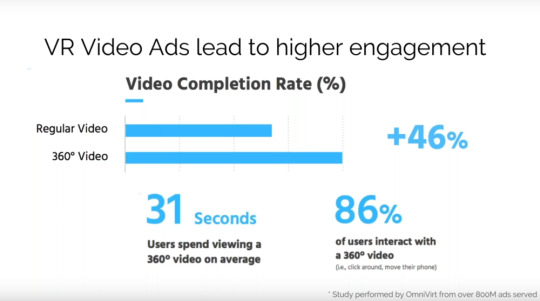
Immersive content should be creative and original as well, to get high exposure. Take inspiration from projects like Google Doodles that landed the company multiple social media mentions and a Grammy nomination.
youtube
Takeaway: To know that you are ready to film in VR, take your time to learn more about the peculiarities of production and hire experienced talent to create creative and affordable immersive videos. Before filming, test your 360-degree video concept. Producing immersive videos is expensive and time-consuming - make sure the idea you are working on is worth your time, budget, and effort.
Top 5 Video Marketing Tools
It’s easier to produce, release, and promote videos when you use dedicated tools. There are platforms that facilitate and automate every asset of video marketing - brainstorming, scripting, production, post-production, release, and promotion. Here are the top 5 tools marketers rely on heavily.
1. Animoto

Animoto is a full video production suite that helps creators from all over the world produce entertaining, educational, and business-oriented video content.
Main features:
Over 50 built-in editable video templates
A lot of room for personalization - add custom fonts, colors, photos, and music to a video
Users can protect their videos as intellectual property by adding a brand-logo watermark to the footage
2. Verb Technology

The platform offers video marketers promotion tools for distributing interactive videos. You will be able to track the progress of your marketing campaign and find out what types of content resonate with audiences on a deeper level.
Main features:
A built-in CRM for interactive video management
Dedicated platforms for creating educative and B2B content
A built-in space or live streaming
3. VideoScribe

VideoScribe is an easy-to-use interactive ecommerce video maker. Here, people with no animation experience can create beautiful how-tos or explainer videos.
Main features:
Easy to use interface
Wide range of video templates
A free version
Advanced exporting options to ensure the video fits any social media
4. Buffer

The platform reigns supreme in the social media management realm. It has a wide range of tools video marketers can benefit from - tracking video engagement, releasing content in batches, scheduling posts, etc.
Main features:
Tools for content planning
Analytics dashboards
Simultaneous posting
Scheduled posting
Collaborative management
5. Vimeo Business

Vimeo Business allows marketing managers to create, edit, and release videos in a single place - you will be able to track the team’s every action and ensure the eCommerce marketing strategy is completed according to plan. Also, thanks to advanced analytics dashboards, you will know exactly how much traction a given clip generates.
Main features:
No storage restriction
Advanced data access settings
Tools for publishing videos on Youtube, Facebook, Instagram, and other social media platforms
A suite for managing 360-degree videos
Conclusion
Video marketing is booming right now - in the next 5-7 years, videos will be a chief way for B2B and eCommerce development companies to find new customers. As a business manager, you need to make the most out of the trend and communicate with viewers efficiently.
Make sure to stay authentic to the company's values in the content you produce - this way, you will attract loyal followers.
Take advantage of new tools social media platforms offer - they help increase engagement and build an active community around the company. Adapt to users’ habits - such as watching videos with no sound on - and make sure your content has captions.
Explore B2B video marketing trends - B2B video markets are still emerging, you have a good chance of making a mark. Using new technologies - such as 360-degree view and VR immersion also helps promote the company as an innovator.
By following these video marketing trends, you will be able to connect with prospective users efficiently and increase the company’s conversion rates.
About the Author

Anastasia Stefanuk is a passionate writer and Information Technology enthusiast. She works as a Content Manager at Mobilunity, a provider of dedicated development teams around the globe. Anastasia keeps abreast of the latest news in all areas of technology, Agile project management, and software product growth hacking, at the same time sharing her experience online to help tech startups and companies to be up-to-date.
from RSSMix.com Mix ID 8230801 https://ift.tt/2HeRSri via IFTTT
0 notes
Text
Experience article #1
Before we begin --
Something among the many nothings I often think of is how a good number of advances in that or the other thing come about after such and such has long left the living. Is this true? I have no idea, and I don't have the ambition to find out if it's true. There are plenty of fun things to recite to ourselves, and as a result of propaganda, bias, and/or censorship, etc., we end up with various levels of comprehension, ignorance, and acceptance. I think how I want. Folks that want to do the same should go about that choice. You take all that stuff you're subjected to and figure out how it makes sense to you. Can I make sense of 2+2 and find an answer to the equation? Yes, on a good day. That concept is fairly certain, at least, for most things that I care to comprehend or show interest in. I'd like to underline: I don't go out of my way to spread misinformation. There are things like fact and opinion, and that's fantastic. The latter: funnily interpreted. Conversely, facts tend to stay the same. Then that's the purpose of the scientific method and all those learned people that seek the "Truth": to go and prove, whether out of curiosity or demand, that this, that, or the other thing make that thing do this thing, and the other things represented there do another thing, etc.
This paper's tone is heavily influenced by the writings of alchemists. This is gold before its purity has been restored; one half of natural gold. This is a passionate attempt to explain what exists without the means and devices and circumstances to extract any more of the Truth from within. So, there validity of happenings may be scrutinized. That is something that is unavoidable; however, a person who has lost their arm knows that their arm is no longer attached to their body. A portait of a blind person is drawn. A person inspecting it might not conclude they cannot see. Similarly, most organisms on this planet eat because they feel hunger. Parallels of these kinds present themselves everywhere. Specifically of the focus of this paper: it is something felt, not seen, and like hunger, there is no device to measure its sensation.*
All we can do is make use of the ~70 years we spend here. While the intent is to bring attention to a phenomenon that exists in nature, I can fully appreciate Their decision to ignore or dispel what is described below. There surely will be ramifications and much frustration felt in many groups when/if technology advances (if need be). On the bright side, there is no one out there that forces you to remember this stuff yet. I'm talking to you, Music Professors/Learned Professionals. Of course, there is always the reality that nothing spectacular happens from here on out. Either way, I'm not holding my breath. This thing can just sit here collecting dust, if that's the way it goes. What matters to me is that I took the time to write this out. Folks can take it or leave it as it is. Just know that Curtis experienced, documented, and offered his mentation on the matter. Need a name? Let's call it "pseudo-vocal science" for now.
Understanding the Full Potential of the Voice
Understanding the full potential of the voice takes years to uncover. In this paper it will be attempted to both bring awareness to one's own voice and describe the complex, yet, simple theory of voice strength. Everything here is taken for granted as there are no research, documented experiences, or data available - period - to argue the finer points. Take what is written here as the understandings drawn from the shell of an idea from one person; no more, no less. There will be included some ideas for voice exercises to play with, though, the main focus herein is to contemplate a mysterious phenomenon that resides in each of our very bodies.
It's called the Theory of Voice Strength. Each individual is born with their own unique voice, and additionally, there is an inherited strength-- voice strength (or voice energy) as well. It's uncertain whether the vocal chords themselves are the reason for the uniqueness of the sound of a person's voice or if it is result of the composition of their voice energy. It may very well be a combination of the two. It isn't too often you hear two voices that sound the same like those from younger twins, for instance. Previous generations typically have stronger voices because it was a necessity to have a strong voice to be heard across greater distances. In today's modern age, there are many reasons why humans don't require strong voices any longer, save for various industrial settings; a person is immersed in a noisy environment, and a fisherman comes to mind too. Instead of relying on our voices like the rest of the animal kingdom does, we have many technological devices to make our communications require much less effort, taking away any burden on our voices.
Evolution is the observable change in organisms [usually] over long periods of time. As far as the observable change in human voices' power is concerned, it is more than apparent if one listens to older recordings. Now, maybe it isn't fair, but the disparity of voice strength between humans and those of animals in the "wild" is unmistakable. Without firsthand experience, it is hard to assert all tribes people surely have much stronger voices than your average city-going citizen. When there is not a necessity for biology to be loud, it simply stops putting in the effort. How else does one explain why change occurs in organisms than by surmising one thing or another was needed due to conditions in its environment; one thing or another was not needed because of the toll and demand on its parents' bodies versus quick, reliable maturation. Humans are quickly losing their voices!
It is understood that our vocal folds grow as we age, thus, changing the deepness of its timbre. Voice strength is no different. From the time we are born to the time we are without life, the growth of this energy is constantly building from the force exerted on it: the desire or striving to be heard. Something that each one of us is familiar with is the wanting to sound "better." In what calibre this behavior manifests is purely a personalized matter. Parents, teachers, peers, those hard at hearing, coworkers-- "They need to hear," or "I want to be heard by," might ring true. These are the basic thoughts, at least, that drive our voices to extend out; and evolution has designed a tested and true device to do just that. Like the heart that which forever cycles the blood in our bodies, voice energy is always moving and compounding on itself by demand. In fact, sleep time may be the only time when it is not. It can only be speculated as to how the energy of the voice behaves during an unconscious period. Perhaps it does indeed accelerate, encouraged to do so from the nature of the dreams we have. So, then from this natural growth to what all this looks like.
The first three images are of (from left to right):The essentially spherical nature of voice energy and two images depicting one of the more common patterns that voice energy makes.
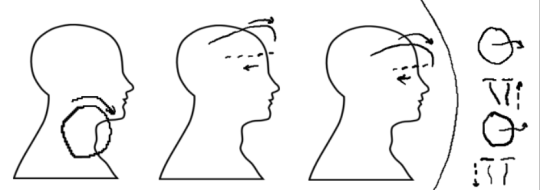
The two pairs of images on the far right are of (from top to bottom): Force exerted outward from below the jaw and the corresponding place an airy sensation is felt in the larynx to its right, leading to a great increase of voice energy, and its opposite counterpart, leading to a great decrease in voice energy.
You are not seeing anything, really. The energy of the voice is obviously not seen but felt. It can be thought of as a large orb around the throat area in its entirety. When put into motion by force, the effects of its energy rotating or growing may be perceived in a limited way. "Waves of growth" is what the behavior of the patterns of the voice energy is called. Above there is illustrated a single fragment of a single piece of a common pattern that voice energy adheres to. It is impossible to record how complex the waves of growth are, and it will likely not ever be possible to properly document how they begin. The most anyone can do is feel them when and how they are felt. Plainly speaking, waves of growth are only perceivable when significant force is placed on the energy of the voice. This 'force' is not to be mistaken as yelling. Rather, it is usually, though not limited to, being felt from the intentional use of voice for a sustained period. One such way is to try to create a moderately high pitch and hold the note very firmly. A sort of pressure in the chest may present amidst any number of other sensations, and even noticeable aftereffects on the whole sound of the user's voice is possible. Examples are enhanced vocal fry, changes to resonance, more difficulty or ease to project the voice out. In any case, expect change when subjecting the voice to strenuous activity. Singers are probably the most aware of the changes in their voice because of certain waves of growth that directly affect the accessibility of their "established" vocal range. It should be noted: When any trait in quality of voice appears during or after any exercising, it is solely the fault of the waves of growth and the state that they've reached.
There is perhaps some truth to 'warming' up the vocal folds; however, states of the voice are things that are ever present and immensely affect one's performance. Make note of how it is impossible to maintain the way your voice sounds at the time you wake up. That is a state. It is surmised that when one comes out of unconsciousness, they are subjected to a state vocal energy settles to. The sound your voice makes at this time is as if it were completely relaxed before transforming, readying itself for use. There are times when vocal fry is harsher or more easily accessed. That is a state. Just the same: after one has exercised or has spoken loudly for a time. These are all states that the voice goes through. It is continually added onto and built and transformed since the very materialization of his/her vocal folds.** It is both necessary and can be very frustrating, especially for a singer, for the states of the voice can only be manipulated so much. Remember: the states of this energy are formed inside the whole "orb" of a person's voice energy. The bigger the orb, the more densely packed the waves of growth are, leading to much longerlasting states. Vocal exercises are proven to work because the force transforms the state into one that is more appropriate for pitch ascent and descent. Beyond this, it is ignorant of wants because it is a natural construct - built to last, and not particularly for the purpose of maintaining a wide vocal range indefinitely. Once the overall orb of voice energy has been sufficiently packed so densely by the waves of growth, its state must change. For music appreciators, this happening is most often witnessed in the recordings of groups where the lead singer makes use of a gradually decreasing vocal range over the span of their career.
In the illustration above there is reference to airy sensations felt in the larynx region when a technique is used to force voice energy to accelerate its growth. The sensation itself is airy, though, it is also so condensed to feel sharp as it rises up. It is not pain. It, also, is not felt in the actual tissue of the larynx but to the left or to its right. To explain this behavior, one may need to fully comprehend the true shapes of the waves of growth in their most rudimentary stages. Until technology has developed to the point where it can measure voice strength and more, we can only guess at the hidden equation that makes it all work. Keep in mind: the one technique known to experience this for one's self comes with significant weight. While it is possible to very quickly "grow" the voice, the potential to weaken it is apparent too. All that can be told of this technique will be available in the following section of this paper.
We've now explored all the new relevant information for the theory of voice strength. Complete technological reliance may not cause biology to do away completely with our voices. The voice, in all probability, will likely merely become the next appendix; worst case scenario. Surely, when the people of human civilization find more confidence in their voices through understanding and the knowledge that this golden age can bring, they will make even the animal kingdom envious. From then on, expect voices as strong and stronger than the vehicles they operate. This is one prospective future mankind has. Although there is so much to learn, the fundamentals of communication is inspired by, first, discovery, and then change.
Technique and some theory
So, basically, the theory behind why this works is that as with the states talked about earlier, a particular state is required from the energy of the voice to allow it to "skip." There is no way to actually know how strong one's voice must be before this technique is possible to perform. All I know is that it took about seven years of singing before the question of what might be possible came to mind. I specify how long it was because it is known that a certain voice strength is needed. Whether it was possible at an earlier time is completely up in the air; though, I am skeptical to believe I could have done it much sooner, given the way my voice had begun to behave in months preceding success. So, yes, there are a couple prerequisites. Among the words I use as terminology, "critical mass" seems to work well with labeling the moment when rapidly accelerating the growth of the voice can be done.
To go about readying your voice you'll need to practice glottal stops while making an uh. I recommend listening to music, uttering to the beat or however it works well for you. Do this for upwards of two hours. Though I have no evidence to support the claim, I do believe it does take some time for the state to come about. You think about how long it takes to "warm up" in vocal exercises to advance the energy so much. An hour may be the minimal time invested. All that is up in the air. Keep in mind: the purpose of these grunts, if you will, isn't to do them haphazardly. You must be trying to make each uniform and the same in every way. You must pay close attention to how it feels when you're doing this too. If they feel different from one to the next, I suspect that is an indicator that the voice isn't strong enough. Furthermore, the purpose of the glottal stops is to have a place to focus on and compare. My vocal experimentation had been going on for about a month with the grunting. Additionally, I found it very helpful to hear the singing of my favourite singers as I was doing this. It served as the catalyst for my epiphany: to try to push the sound of the glottal stop out. It was from hearing the "impact," for lack of a better word, during their singing that made me wonder if the answer was so simple. It was, honestly, the next day after the thought came to mind that I tried to do this and succeeded. It pretty well just feels like your voice skips out from your mouth, along with the sharp, airy type feeling rising up the right side of the larynx.
I want to go over how I think you avoid weakening your voice too. Essentially, you just talk (and/or sing) like normal. Don't let the waves of growth or abrupt change of states make you think you need to change anything in the focus of your speech. I found they really confused me when I was feeling them. For instance, there seemed to be a sort of sweet spot that you reach just a little ways up to during the technique. Of course, I'm not talking about pitch. That led me to try to speak that way; to try to achieve that same spot during regular speech. The best advice I can give is: don't do that. Talk regularly and save the change in focus for when you're out exercising, if you do this at all.
You know, I'll admit, I do have the worry that there will be those that are successful, and then succumb to weakening their voices. Whether it's on purpose or accident, it really doesn't matter. The bottom line is: the effects are permanent; or they'd may as well be seen that way. The rapid development of voice energy you experienced while you were in the womb is not possible once you're out and about. You can expect to never be able to recover the power you once had. So, don't fool around. This technique is basically like taking nature in your hands and modifying it at will. It's not something to take lightly.
Q & A
Q: I've been yelling like you said and nothing is happening. What am I doing wrong?
A: There is no yelling involved in any of this. People have been yelling with all their hearts for centuries. Don't expect anything miraculous to happen doing that.
Q: What does all this mean?
A: This paper explains why some people are naturally louder than others (not just loud personalities), why many people that try to sing, can't, and by extension, why voices change the way they do as we age.
Q: Can anyone do this?
A: I don't know. Probably.
Q: Are you sure you're not just the only person in the world with this ability to make your voice louder?
A: While that's a cute thought, I do have the suspicion that someone somewhere has accidentally done it.
Q: Why are you posting this on Tumblr instead of to a peer-review what'cha-ma-call-it place?
A: Because this is part of my thoughts and experience program. Besides, would you take a submission like this completely unscientific, completely lacking data and evidence with bad grammar paper as anything more than some crazy shenanigans?
A: Please don't answer a question with another question.
Q: Is this meant to be serious?
A: Yes. It was my intent to write out what I've come to understand (as rationally as possible) after experiencing what I have with voice experimentation.
Q: How does this affect me?
A: Think about it like driving a car. You don't know how the car works, but it drives around just the same. ut if you want to be able to understand how the car works, you'll read about it.
Q: Do you believe in ghosts?
A: Kind of, I guess. I don't really care. If they exist, then that's good for them.
Q: What are your thoughts on measuring voice strength?
A: I have a couple ideas. My first idea was using burps, as ridiculous as that sounds. The issue being that no burp is the same as another. Not to mention you can push a burp out with the abdomen. The second idea is vocalizing while inhaling. There's only so much anyone can do to force air in and vocalize at the same time, so it's fairly sure to give okay results. The disparity in voice strengths might be noticeable for someone hearing for it. Under these circumstances it is unmistakable.
Q: If this picks up and lots of singers begin to take advantage of this, what do you think would happen?
A: Well, that would be up to them. There might be those that want to have voices stronger than a jet engine. Others might be satisfied with just not needing a mic any more. I can't help but wonder what it feels like to have a voice (as modest as it sounds) as strong as an elephant or other large animal. I'm sure it feels unreal, especially when the strength of a regular voice feels pretty cool by itself.
*There may be a device to measure the sensation of hunger
** Probably
9.9 experience out of 10 experience points.
0 notes